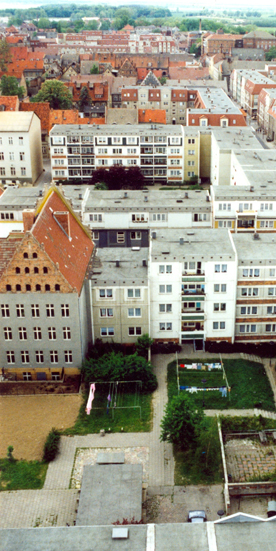Pilot projects of urban renewal in historic city centres in the GDR

The central focus of this research project is the experimental planning and construction methods of the 1970s and 1980s in the East German cities of Bernau, Gotha and Greifswald. According to a decision made by the Central Committee of the SED on the 2nd of October 1973, the building projects of these cities were declared to be used for the development and testing of exemplary urban and architectural design principles for the socialist transformation of the old town centres of small and medium cities.
The plans of the GDR Building Academy for the ’reconstruction of historic city centres’, was a mix of repair, modernisation, refurbishment and demolition of old buildings with subsequent redevelopment. An essential part of the building initiative was to integrate the technological developments of adapted forms of concrete slab building for historic urban centres. Despite having the same set objectives and requirements, all three cities produced different solutions.
From a cultural studies perspective, the research project uses a comparative analysis of cities to demonstrate the ideological and material inconsistency of urban heritage appropriations in the late phase of the GDR. On the one hand, the value of existing individual monuments and historic ensembles was emphasised, and there was a will to hold on to them, while on the other hand, the guiding principle of these measures was to achieve the greatest possible elimination of old buildings. Some earlier plans advised that the original historic town structure should be preserved according to the cityscape, whereas in other plans it is only the later revisions of the construction projects that advocate retaining the original town structure wherever possible. Meanwhile, the fruit of these communist-era construction and reconstruction projects have themselves become historical objects, so the question of how to deal with the historic urban environment in historic town centres arises once more.
This project collaborates with the Leibniz Institute for Research on Society and Space Erkner.
Researcher: Katharina Sebold
